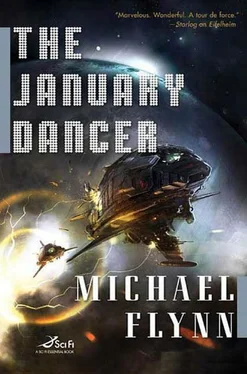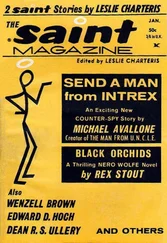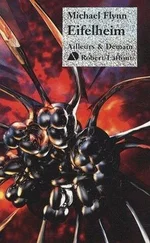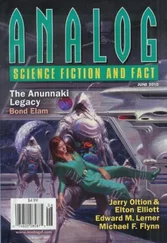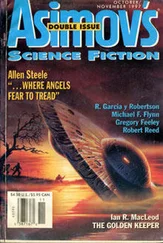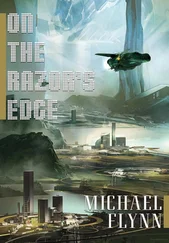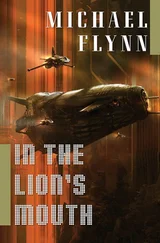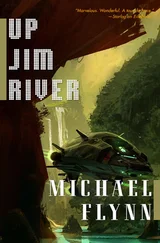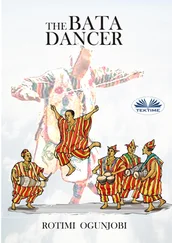She plays the Dancer theme that she developed on the first day. It is more fully realized now, less uncertain. But it starts quietly and most of those in the plaza do not yet hear it. The adolescents nudge one another and finally push forward one of their number, who stumbles a little in the harper’s direction, looks back over his shoulder, then approaches, his hand thrust deeply in a pocket of his robe. He fingers something, and the harper notes from the drape of the cloth that it is shaped like the barrel of a gun.
The music builds in volume and tempo. The stately quadrille begins to break into wilder beats: a gallop below which her thumb strikes a thumping bass of thunder. More windows have opened on those facades possessing them. One of the men squatting against the wall—he has a face like a vulture—has risen, and he comes to stand beside her, but a little behind, just out of her vision. “Sweet,” she hears him say, but whether sincere or sarcastic—or even whether directed to the music—she does not know. The man with the guava cuts a final slice and wipes his hand on his shirt and his sleeve across his lips. He studies her and gauges the clothing, the harp, the scrip belted to her waist.
The pock-faced youth before her pulls the tube from his pocket. Her fingers falter just a moment and for the first time in many years she strikes a false note. But the boy has pulled out a Terran tinwissle —a simple tube with finger-holes and a whistled mouthpiece—and after a moment’s further hesitation, he begins to play against her, picking up the dance as it whirls into a reel, pulling it up above her register and spinning it free. He is not a terribly good player and his fingers often hold a note rather than dare dance it in thirty-seconds, but he stays close to her—and he has heard the tune only once. His friends cheer him and he blushes and loses the tempo, pauses, then picks it up again.
The vulture-faced man tosses a few coins into the open harp case.
More upper-story windows are open now, and in one of them a blowsy, large-breasted woman leans on the sill, listening. The children, the ones who had pushed the piper forward, are dancing now, ring-a-rosie. A few people jostle and shove in the small crowd that now surrounds the harper. Now and then, a coin rings in the harp case. Not all smile. Some eye her with suspicion, or even hostility. One man, seizing the advantage of the sudden audience, juggles balls in the air by the arcade; another, seizing the same opportunity, moves about, lightening purses until an onlooker on a balcony spies him and raises the hue-and-cry, and the man plies swift heels for the nearest airyway with others in hot pursuit. The harper mocks his flight with galloping strings before resuming the geantraí.
She shifts tempos abruptly, confusing the dancing children and the piper, who takes his whistle from his lips and listens to the new melody, nodding his head to the beat until he can pick it up once more. She plays January’s Song and then the Lament for Little Hugh. The latter stills the jostling crowd, and the piper trills a high sweet melody of his own above the weeping strings. The harper finds his melody attractive and brings it down to a lower register with intricate glissandos and grace notes, runs some variations on it, then, with a nod to the boy, gives it back to him, its sweetness now shaded with poignancy. When she segues to Death in the Gully and introduces The Fudir’s Theme, she uses a mode beyond both the piper’s kenning and the bore of his whistle. It is a minor key, and he has not a second pipe. His high, pure piccolo notes still, leaving only the darker thrumming of the clairseach’s metal strings. It is only coincidence that clouds pass before the afternoon sun and cast a sudden shadow on the square.
No one dances now. Few dare breathe.
A man with a tabla has pushed through the press and sits now at her feet, with his hands poised over the drumhead; but he dares not strike, for such a melody flows beatless toward a distant ocean. It is not the alap with which he is familiar, but the long line of an ancient poetry in a forgotten country of green downs and chalk cliffs. It is a murmur of their spirit that has survived the ages.
The harper whispers sixteen to seven to the tabla man and dee to the young piper and, at her nod, tin whistle soars and hands patter in drut-laya and the dark thrumming strings burst into sunshine. Triumph! The treacher tricked! The audience cannot restrain a shout and the children leap and clap and pick up their dance where it had fallen. The vulture-faced man nods, as if passing judgment. Yes, it is exactly right. Nothing has ever so sweet a taste as after despair.
She will not take them further, not to the desolation of the Rift or the Rieving of New Eireann, not to the hall of heads on Peacock Junction. It is too bright an afternoon for that. She gives them a sample of Bridget ban’s theme—it is not yet fully realized—and allows the music to fade into the mysteries, into diminished sevenths, before stilling her strings.
The tabla man grunts with satisfaction and the young piper grins. The crowd murmurs its satisfaction—it is not their way to clap hands—and they begin to break up. The young boy holds his tinwissle up to her in both hands and the harper, remembering a story she once heard from a Terran “saxman” on Jenjen’s Khōyāstan, takes it in her own hands and gravely kisses it before giving it back to him. The boy backs two solemn steps away and then boyishness triumphs and he turns and rushes to rejoin his companions.
The harper has thought that in such a mood the locals might answer her questions, but when she mentions the scarred man, they turn away and begin chattering among themselves. The sesta is past and the plaza begins to fill with the usual late-afternoon bustle of people busily going nowhere in particular.
“I take you, missy.”
It is the jowly man in the blue-checked dhoti. His smile is oily; his lip wet with perspiration. “Scar-head, me, goombah. I take you him.” His eyes are harder than his smile and they smolder. The harper hesitates. “Chel, Memsahb,” he says. “He no long one place.”
“Give me one minute.” The harper bends to put the harp back in its case and notices with no surprise that the modest pile of coins that had gathered there is now gone.
But when she straightens, harp case now slung over shoulder, the man in the dhoti stands with a fixed, glassy smile, looking past her. “No, missy. So sorry. Not know him, scar-head.” He turns and walks away and the man behind him, who had eaten the guava, now puts his knife away. He bobs his head to her. “We watch ’um, such men, no touch women. E’en so, eetee woman.”
Then, he, too, turns and walks away.
The harper sits suddenly on the edge of the fountain.
“We don’t know how you came this far,” says the scarred man, who is sitting on the other side of the fountain, his back to her. He rises and comes around to sit beside her. “That was a fool’s play. How did you ever hope to find us?”
“It can’t be so foolish as all that, seeing that I have.”
The scarred man grunts. “He heard you playing that theme, and we knew you’d stuck your head in the lion’s mouth.”
“That’s why I played. You can’t catch a man by chasing him. Better betimes to remain still, and he will come to you.”
Several loiterers had edged closer to them and the scarred man jumps suddenly to his feet and cries, “Yo, skevoose! Go see where you gotta be. Scat, before I give you leather in the kuli.” They slink off and he resumes his seat. “Pay the illiewhackers no mind.” He strikes his fist into his palm and rubs it. “Why did you come after me? What is it that she wants?”
Читать дальше
